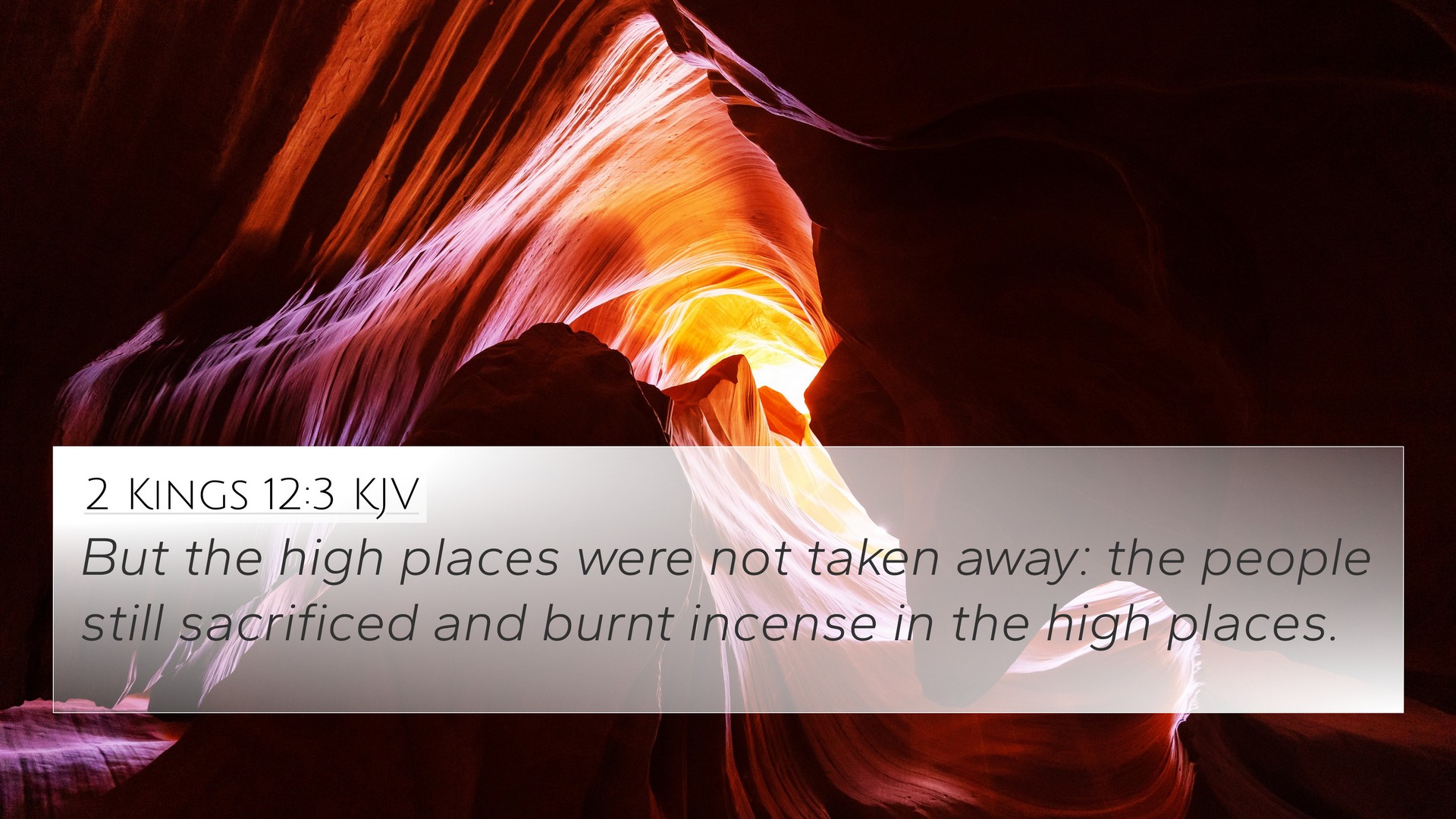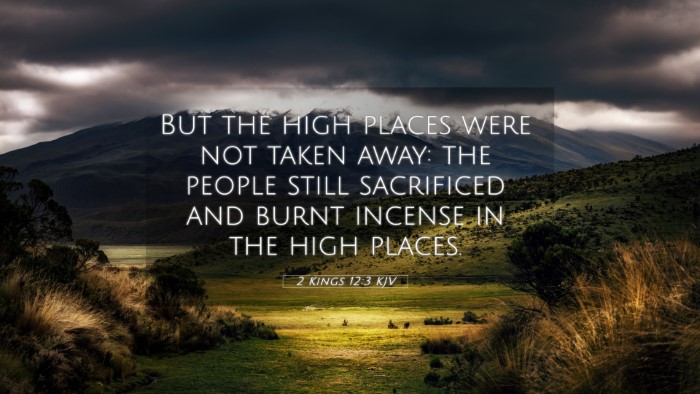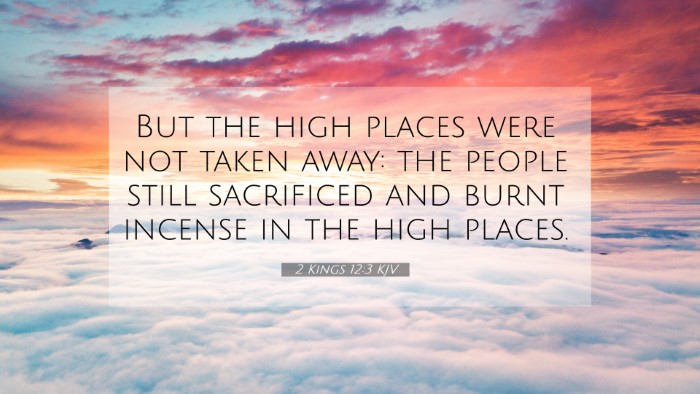Old Testament
Genesis Exodus Leviticus Numbers Deuteronomy Joshua Judges Ruth 1 Samuel 2 Samuel 1 Kings 2 Kings 1 Chronicles 2 Chronicles Ezra Nehemiah Esther Job Psalms Proverbs Ecclesiastes Song of Solomon Isaiah Jeremiah Lamentations Ezekiel Daniel Hosea Joel Amos Obadiah Jonah Micah Nahum Habakkuk Zephaniah Haggai Zechariah Malachi2 Kings 12:3 Similar Verses
2 Kings 12:3 Cross References
But the high places were not taken away: the people still sacrificed and burnt incense in the high places.
Uncover the Rich Themes and Topics of This Bible Verse
Listed below are the Bible themes associated with 2 Kings 12:3. We invite you to explore each theme to gain deeper insights into the Scriptures.
2 Kings 12:3 Cross Reference Verses
This section features a detailed cross-reference designed to enrich your understanding of the Scriptures. Below, you will find carefully selected verses that echo the themes and teachings related to 2 Kings 12:3 KJV. Click on any image to explore detailed analyses of related Bible verses and uncover deeper theological insights.
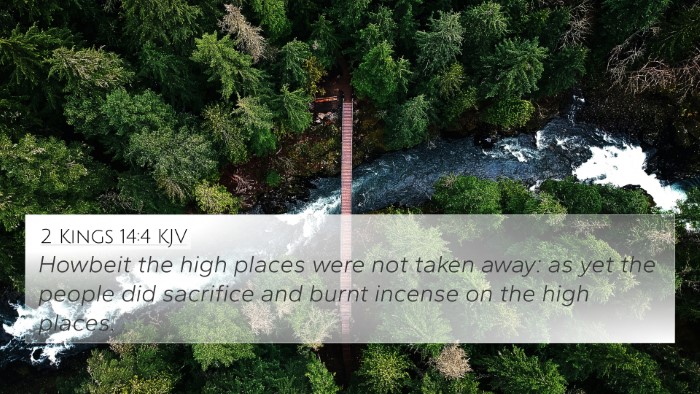
2 Kings 14:4 (KJV) »
Howbeit the high places were not taken away: as yet the people did sacrifice and burnt incense on the high places.
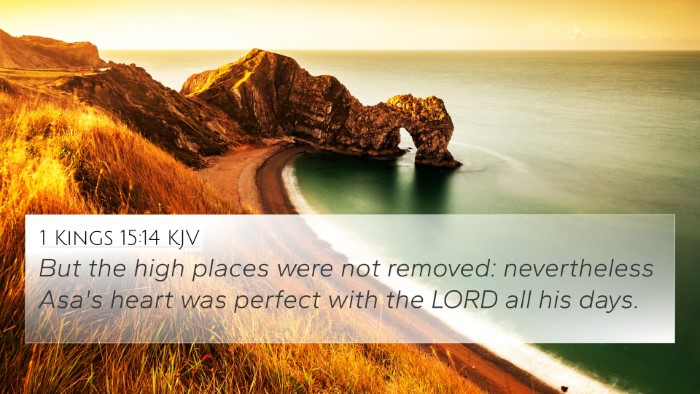
1 Kings 15:14 (KJV) »
But the high places were not removed: nevertheless Asa's heart was perfect with the LORD all his days.
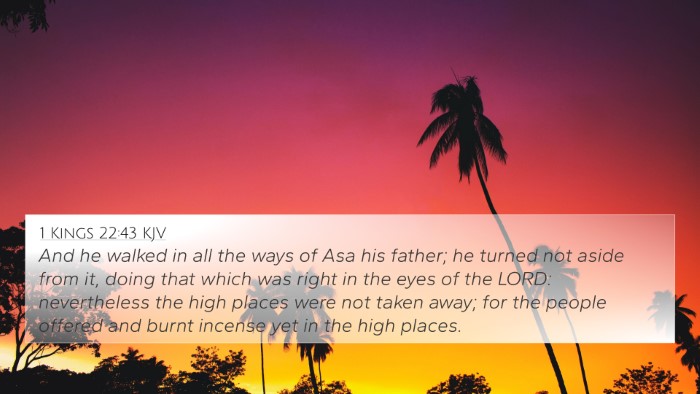
1 Kings 22:43 (KJV) »
And he walked in all the ways of Asa his father; he turned not aside from it, doing that which was right in the eyes of the LORD: nevertheless the high places were not taken away; for the people offered and burnt incense yet in the high places.
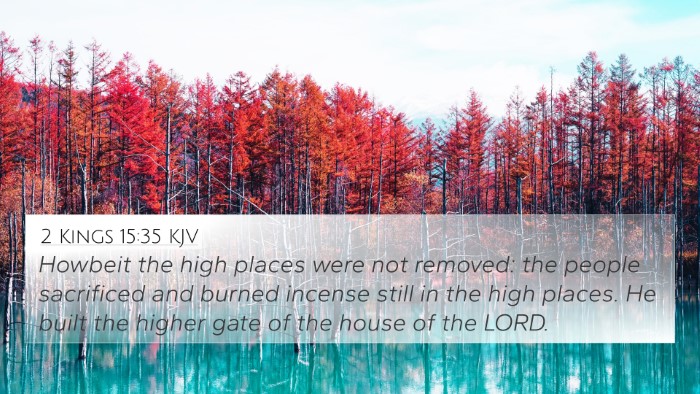
2 Kings 15:35 (KJV) »
Howbeit the high places were not removed: the people sacrificed and burned incense still in the high places. He built the higher gate of the house of the LORD.
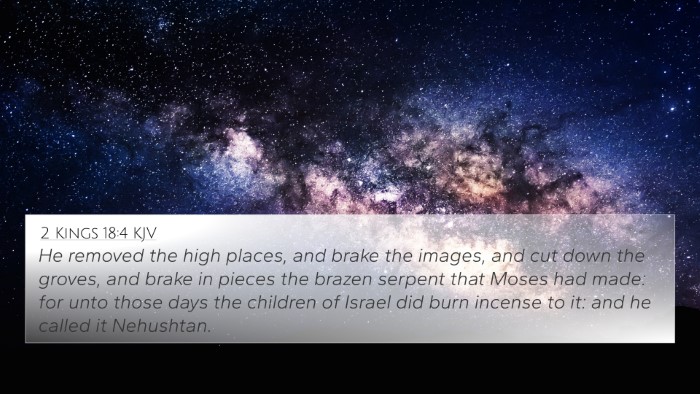
2 Kings 18:4 (KJV) »
He removed the high places, and brake the images, and cut down the groves, and brake in pieces the brazen serpent that Moses had made: for unto those days the children of Israel did burn incense to it: and he called it Nehushtan.
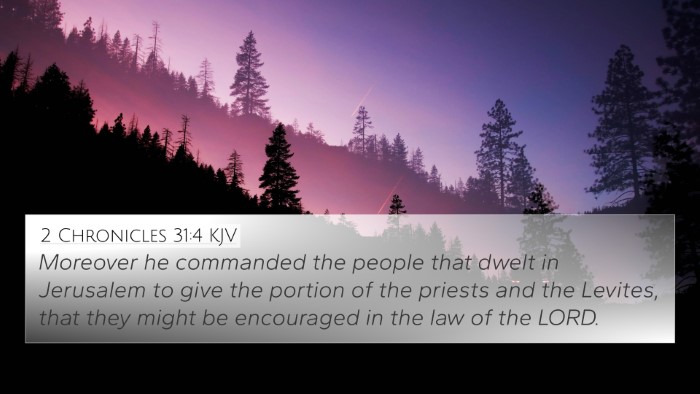
2 Chronicles 31:4 (KJV) »
Moreover he commanded the people that dwelt in Jerusalem to give the portion of the priests and the Levites, that they might be encouraged in the law of the LORD.
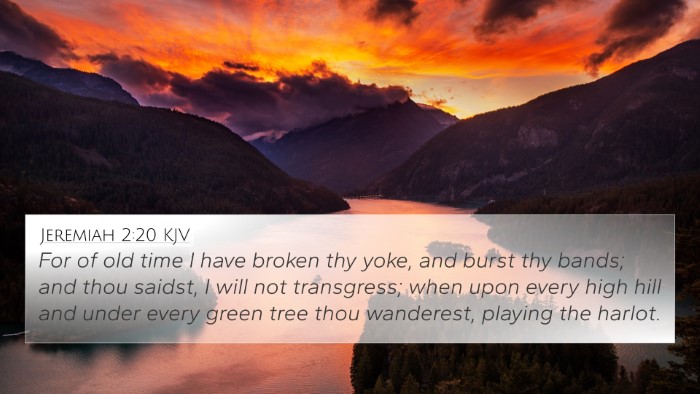
Jeremiah 2:20 (KJV) »
For of old time I have broken thy yoke, and burst thy bands; and thou saidst, I will not transgress; when upon every high hill and under every green tree thou wanderest, playing the harlot.
2 Kings 12:3 Verse Analysis and Similar Verses
Understanding 2 Kings 12:3
2 Kings 12:3 states: "But the high places were not taken away: the people still sacrificed and burnt incense in the high places." This verse provides critical insight into the spiritual and religious practices of the people during the reign of King Jehoash (Joash) of Judah. It highlights the persistence of idolatrous worship despite efforts to centralize worship in the Temple. Below, we explore the meaning and implications of this verse through the lens of several public domain commentaries.
Contextual Overview
In the context of 2 Kings, Jehoash comes to the throne at a young age after the death of his grandmother Athaliah, who had eliminated the royal line. Under the guidance of the high priest Jehoiada, Jehoash begins to restore the Temple and reinstate true worship in Judah. However, despite these efforts, the high places—locations of unauthorized worship—remain, indicating a divided fidelity among the people.
Commentary Insights
- Matthew Henry: Matthew Henry notes that although Jehoash initiated significant restorations of the Temple worship, the persistence of high places illustrates the incomplete reform of religious practices. The high places symbolize a compromise in worship, representing the people's inclination towards syncretism where they blended their worship with other practices rather than adhering solely to the worship of Yahweh in the appointed place.
- Albert Barnes: Barnes emphasizes that the high places were a central issue in the reform efforts. While Jehoash was zealous for the Temple, the ongoing sacrifices at the high places indicated that the people had not fully embraced the reforms. This underscores a broader theme of the struggle between true worship and idolatrous practices throughout the history of Israel.
- Adam Clarke: Clarke delves into the reasoning behind the people's continued sacrifices at the high places. He points out that the high places were often seen as convenient locations for worship, suggesting a human tendency to worship in ways that are comfortable rather than according to divine mandate. Clarke's analysis reflects on the tensions between tradition and obedience to God's commandments.
Thematic Connections
This verse resonates with several broader themes in Scripture, particularly regarding worship, idolatry, and reform. The failure to eliminate the high places can be viewed as a warning about the dangers of allowing competing influences in one's spiritual life. Several cross-references further illuminate this issue:
- Deuteronomy 12:2-4: This passage instructs the Israelites to destroy the places where the nations worshipped their gods, emphasizing the need for singular devotion to God.
- 2 Kings 15:35: In the days of Azariah (Uzziah), similar issues regarding the high places are mentioned, showing a pattern of incomplete reforms.
- 1 Kings 3:2: Solomon also encountered the high places early in his reign, demonstrating a long-standing issue for the Israelite kings.
- 2 Chronicles 24:4-14: The parallel account of Jehoash’s reign discusses his reforms in greater detail, providing context for his actions.
- Jeremiah 7:30-31: This text condemns the high places, illustrating God's disdain for their continued existence and the associated practices.
- Hosea 4:13: The Prophet Hosea critiques Israel for sacrificing on the high places, highlighting the consequences of such actions.
- Matthew 5:8: In the New Testament, Jesus speaks of purity of heart, indicating a deeper need for true worship beyond physical locations.
Lessons and Applications
The narrative of 2 Kings 12:3 serves as a timeless reminder of the challenges faced in maintaining pure worship and the importance of identifying and removing idols from our lives. Here are several key lessons:
- The Danger of Compromise: The presence of high places represents spiritual compromise, emphasizing the need for unwavering dedication to God alone.
- Importance of Reform: Just as Jehoash sought to restore the Temple, believers today are called to restore their relationship with God by ensuring their worship aligns with biblical principles.
- Community Influence: The people’s reliance on high places suggests that collective worship practices can shape individual beliefs, underscoring the need for sound teaching and influence within the community of faith.
- Personal Reflection: Individuals are encouraged to reflect on personal 'high places' in their lives—those areas where they may be compromising true worship by allowing secular influences.
Conclusion
2 Kings 12:3 provides rich insight into the spiritual condition of Judah during King Jehoash's reign. As we explore the connections between this verse and others throughout the Bible, we deepen our understanding of themes surrounding idolatry and worship. The continued sacrifices at the high places serve as a poignant reminder of our call to purity in worship and the necessity of eradicating any semblance of idolatry from our lives. By engaging with these interconnected scriptural insights, we can cultivate a deeper relationship with God and ensure our worship is true and pleasing to Him.
Resources for Further Study
For those looking to dive deeper into comparative Bible verse analysis and cross-referencing Biblical texts, consider utilizing tools such as:
- Bible concordance to identify relevant passages and themes.
- Bible cross-reference guide to explore verse connections.
- Cross-reference Bible study materials for group discussions.
- Comprehensive Bible cross-reference systems to deepen your studies.
